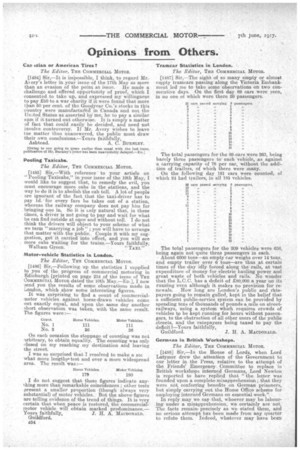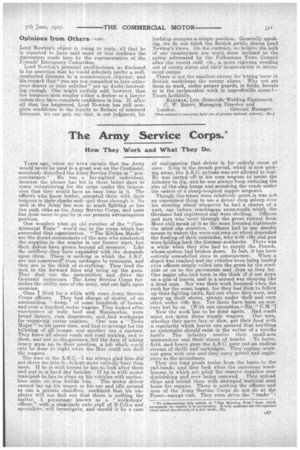Opinions from Others.
Page 16

Page 17

If you've noticed an error in this article please click here to report it so we can fix it.
Can Ldian or American Tires?
The Editor, THE COMMERCIAL MOTOR.
[1484] Sir,—It is imPossible, I think, to regard Mr.. Avery's letter in your issue of the 17th May as more than an evasion of the point at issue. He made a challenge and offered opportunity of proof, which I consented to take up, and expressed my willingness. to pay 150 to a war charity if it were found that more tban 50 per cent, of the Goodyear Co.'s stocks in tbis country were manufactured in Canada and not the United States as asserted by me, he to pay a similar sum if it turned out otherwise. It is simply a matter of fact that could ,easily be decided, and need not involve controversy. If Mr. Avery wishes to leave the matter thus unanswered, the public must draw their own conclusions.--Yours faithfully,
Ashtead. A. C. BURNLEY.
[Owing to our going to press earlier than usual with the last issue, publication of Mr. Burnley's letter has been unavoidably dolayad.–E D.] Pooling Taxicabs.
The Editor, THE COMMEROUL MOTOR.
[1485] Sir,—With reference to your artielo on "Pooling Taxicabs," in your issue of the 10th May, I would like to suggest that, to remedy the evil, you must encourage more cabs in the stations, and the way to do it is to abolish the cab toll. A lot of people are ignerant of the fact that the taxi-driver has to pay Id. for every fare he takes out of a station, whereas the railway company does not pay him for _ bringing one in. So it is only natural that, in these times, a driver is not going to pay and wait for what he can find outside at once and without toll. I do not think the drivers will Object to your scheme of what we term "marrying a job " ; you will have to arrange that matter with the public. Couple it with my suggestion, get it carried into effect, and you will see more cabs waiting for the trains.—Yours faithfully,
Walham Green.
Motor-vehicle Statistics in London.
The Editor, THE COMMERCIAL MOTOR. • [1486] Sir,—Followingup the statistics I supplied to you Of the progress of commercial motoring in Edinburgh [printed on page 234 of the issue of THE COMMERCIAL MOTOR dated the 10th May..—ED.], I now send you the results of some 'observations made in London, which show sortie interesting figures. It was surprising to' find a count of commercialmotor vehicles against, horse-drawn vehicles come out exactly equal, and upon the same day another short observation was taken, with the same result. The figures were:— . Comet. Heise VehieleS, Motor Vehicles.
No. 1 111 111
No. 2 :6 30 On each occasion the stoppage of counting was not ,irbitrary, to obtain equality. The count-lug was only elosed on my reaching my destination and leaving the street.
I was so surprised that I resolved to make a sin what more lengthy. test and over a more widespread area. The result was : Horse Vehicles, Motor Vehicles.
179 180 I do not suggest that these figures' indicate anything more than remarkable coincidences; other tests present a smaller proportion (though always very substantial) of motor vehicles., But the above figures are telling evidence of the trend of things. It is very certain that when peace is restored, the commercial motor vehicle will obtain marked predominance.— Yours faithfully, J. H. A. MACDONALD. Guildford.
e54 Tramcar Statistics in London.
The Editor, THE COMMERCIAL MOTOR.
[1487] Sir,—The sight of so many empty or almost empty tramcars passing along the Victoria Embankment led me to take some observations on two consecutive days. On the first day 89 cars were seen, in no one ot which were there 20 passengers.
The total passengers for the 89 ears were 263, being barely three passengers to each vehicle, as against a carrying capacity of 78 per car, without the addition of trailers, of which there were many. On the following day 161 cars were counted, of which 21 had trailers, in all 185 vehicles.
The total passengers for the 209 vehicles were 636, being again not quite three passengers in each.
About 6000 tons—an empty car weighs over 14 tons, and empty trailer over 6 tons—are thus at certain times of the day idly forced along the rails, at vast expenditure of money for electric hauling power and great waste of both vehicles and rails. No wonder that the L.C.C. has a deficit of 180,000.a year on its running even although it makes no provision for renewals. How long are London's public and rb,tepayers going to remain gulled, kept in the belief that a sufficient public-service system can be provided by spending tens of thousands of pounds a mile on streetrailways, using a system which requires crowds of vehicles tp be kept running for hours without passengers, to the obstruction of all other users of the public streets, and the ratepayers being taxed to pay the deficit ?—Yours faithfully,
Guildford. J. H. A. MACDONALD.
Germans in British Workshops.
The Editor, THE COMMERCIAL MOTOR.
[1488] Sir,—In the House of Lords, when Lord Latymer drew the attention of the Government to our letter in. the Press, relative to the attempt of the Friends' Emergency. Committee to replace in British workshops interned Germans, Lord Newton is reported to have replied that "the letter was founded upon a complete misapprehension; that they were not, conferring benefits on German prisoners, but simply carrying out the Home Office scheme for employing interned Germans on essential work." In reply may we say that, whoever may be labouring under a misapprehension, we certainly are 'not. The facts remain precisely as we stated them, and no serious attempt has -been made from any quarter to refute them. Indeed, whatever may have been Lord Newton's object in rising to reply, all that be is reported to have said more or lessconfirms the statements made here by the repre-sentative of the Friends' Emergency Committee.
Lord Newton's personal predilections, as disclosed in his assertion that he, would infinitely prefer a well • conducted German to a conscientious objector, and his remark that" you are not compelled to love either . your doctor or your solicitor" are no doubt interesting enough. One might usefully add, howe,vei, that few business men employ either a. doctor or a, lawyer unless they have complete confidence in him. If, after all that has happened, Lerd Newton has still complete confidence in the loyalty to Britain of interned Germans, we can enly say that, in our judgment, his
lordship occupies a unique position. Generally speaking, we do not think the British public shares Lord Newton's views. On the contrary, we believe the bulk of our countrymen are much more inclined to the policy advocated by the Folkestone Town Council after the recent raid, viz., a more rigorous weeding out of enemy aliens and their incarceration in iiiternruent tamps.
There is not the smallest excuse for letting loose in British workshops the enemy aliens. Why not set them to work, under proper guards, in fields, forests or in the reclamation work in unprofitable areas ?— Yours faithfully, BARIMAR, LTD. (Scientific Welding Engineers). C, W. BRETT, Managing Director and
London. General Manager. [This subject is becoming daily one of greater national connern.—Irm.]




















